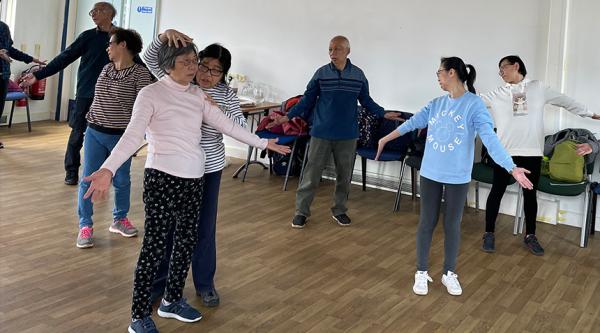Sharing my love of karate with people affected by young-onset dementia
John Brinda, in Hertfordshire, is sharing a lifelong passion for karate with others affected by young-onset dementia.
My partner Sonja was diagnosed with early-onset Alzheimer’s disease aged 55.
Receiving this diagnosis so young put life on hold for my family, including my stepdaughter at a time when she really needed her mum.
Sonja was very bright and bubbly – the life and soul of the party. She loved to dance, and everybody loved Sonja.
We started noticing changes to her personality and memory five or six years ago, but never thought it could be dementia.
We assumed it was the menopause.
A confusing time after young-onset diagnosis
We went to the GP and Sonja had some memory tests. At first, they didn’t think it could be dementia because of her age.
Sonja was prescribed medication, which she didn’t take.
She was in denial about having dementia and would tell the memory clinic she was fine. It was a confusing time.
For a while I carried on my job as a bus driver, but Sonja became worse over a period of six to eight months and things became too much.
By August 2021, it was evident Sonja couldn’t look after herself at home and I became her full-time carer.
A variety of factors, including Sonja becoming aggressive, led to her being sectioned in 2022.
This was a turning point, as she was finally able to get the level of care that she needed.
Sonja now lives in a nursing home. She’s at the stage where she doesn’t walk or talk, though she still recognises me as I visit regularly.
Shared passion for karate
I have trained in karate for over 40 years and taught part-time, sometimes with Sonja.
We both have black belts and Sonja has medals and pictures in her room.
One day during a visit, I decided to bring some focus mitts – gloves that you hit or slap in karate. Sonja’s face lit up. She was hitting the pads and really laughing.
When it comes to dementia, people can feel frustration and anger.
I realised that karate could be a positive and safe outlet for that.
Martial arts for people with dementia
Sonja and I used to attend a young-onset support group run by Hertswise, a local partnership.
I continue to go as I still really benefit from it, and decided to bring karate to the group.
I taught a few sessions and they were really well received.
Karate can be adapted so well. For instance, you can slow movements down so they look like tai chi, and combine them with breathing.
We did a series of gentle exercises and I made sure everyone was included.
It’s convinced me that exercise and martial arts can have a really positive impact on people living with dementia.
Using my experience
As a carer, I felt like I’d lost my sense of identity.
When you do something like karate with the person you care for, you’re working together and can step outside of the carer role.
I’ve now decided to work for Hertswise, so I can use my experience to help others affected by young-onset dementia.
Influence our work
Help shape our work through Dementia Voice, and use your experience to ensure everything we do reflects the needs of people affected by dementia.


